Time Must Have a Stop
I haven’t been feeling much like myself lately.
Doubt anyone has, what with COVID time making everything take twice as long and be four times as frustrating, with Putin being, well, a massive, invasive dick, with inflation the highest it’s been since I was five years old, and with no spring baseball. [UPDATE: Baseball is coming back!]
Life has been rather uncomfortable for basically everyone—triply so for anyone with children, and sextuply so if you have three—and I don’t pretend to have any great insights, or try and make the case that I’m in some way unique. No, not by a long shot. But I’m becoming more and more aware of how the fuckery of time and stress has been acting its way through me, and I need this to stop.
I’ve always tried to do too many things at once—Open Letter + Best Translated Book Award + teaching classes + Translation Database + writing biweekly posts + two podcasts—but when John O’Brien passed away, things reached a new level. (Follow my not at all regular substack “Mining the Dalkey Archive” for more.) Overseeing over fifty titles a year, along with a 1,000 book backlist is quite exciting . . . and murder on the last remaining shred of my “work-life balance.”
Working hard is a very American virtue, and one that we, collectively, seem to finally be questioning. (Speaking of, fuck Daylight Savings Time and its corporate sponsors.) We all deserve some time to ourselves. Some time to be ourselves instead of our jobs, our labels. To not be a parent or an editor or someone who is perennially behind on spreadsheeting.
For years, writing these blogs has been my preferred form of self-care. Set myself up with a beer and/or a whiskey, let my mind spill out—unfiltered—all over the page. This was a place of pure honesty, which is a true double-edged sword. On the one hand, speaking your truth can center you, can help you (or at least me) think through complicated issues and ideas in a creative way. At the same time, making an opinion or idea public is a true risk. Pissy comments, semi-serious cancellations, losing your job because you like jokes about butts—all these are possible, all these are internalized regulators that make it really easy to pause, to not say something that might launch a dozen sub-tweets about your ignorance . . .
I know that in the past, my “articles” walked that line between semi-informed, somewhat rational opinion pieces, and anger-making diatribes. I crossed the line willy-nilly, mostly for laughs, sometimes to prove a “point.” And I’ve had to live with the consequences. To this day, most people think I’m a crazy madman who hates the world (I don’t! Although writing the edges of that character can be fun.) and because of this reputation certain poet translators people will take a non-aggressive statement as some sort of condemnation.
It’s paralyzing to think this way. It’s time to find a balance again. To push the limits and have some fucking fun. The sad, scared times must come to a stop.
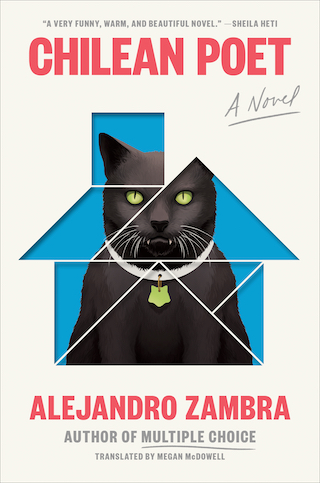
Chilean Poet by Alejandro Zambra, translated from the Spanish by Megan McDowell (Penguin Random House)
A couple weeks ago, a prominent experimental writer started a thread on Twitter (possibly inspired by a bottle of mezcal) following the “feeling cute might delete later” meme. But instead of a mildly attractive, no filter selfie, they posted a series of hot takes on books/authors universally praised by the international literature community. This was so refreshing to see!
Of course, now it’s been deleted 🙁
Such is baseball, such is life.
But I did manage to screen cap one little bit of the thread. A bit that included the following:
- You can read When We Cease when you’re hungover because it’s just data strung together entertainingly [Chad Note: But not all that entertaining if you know much about math or science.]
- Zama‘s as boring as the movie
- Chilean Poet is a fun conventional novel the author probably wrote because he had a mortgage to pay now
That last one is a sick, sick burn—and one I’m 100% behind.
I haven’t read Chilean Poet (this’ll come up again in a minute, but I haven’t read any of the books on this list—no time!), but I’m always a bit gleeful to see someone criticize Zambra.
Yes, we published The Private Lives of Trees, which was also Megan McDowell’s first published translation (! Open Letter is always ahead of the curve), and I was one of his earliest champions. But since he told two of my translator friends plus two Open Letter authors to relay to me that I’m a “son of a bitch,” I figure it’s time to be honest.
Alejandro Zambra is massively overrated.
(And Neal Stephenson is Ayn Rand for crypto bros.)
My opinion, isn’t a form of hate, nor a comment on his background, looks, or general demeanor. At least one of us is willing to punch above the belt.
He hates me because his third novel, Ways of Going Home, isn’t very good, and I was very, very honest about it. (This review actually cracks me up. Especially the bit about the character who “shuts her vagina completely.”) That was the beginning of his decline as an interesting author. The James Wood Praise Piece™ was a really public nail in Zambra’s reputation as someone capable of surprising prose. Multiple Choice is a shitty, flaccid Barthelme knock-off. Establishment authors are generally so . . . establishment.
At least he has a mortgage to pay. Hit pieces on sacred cows only get you a one-bedroom apartment. In Rochester.
Also, XXXXX, it’s so weak you deleted your thread. I’m going to make it a contractual rule that you can’t do that when I publish your books.
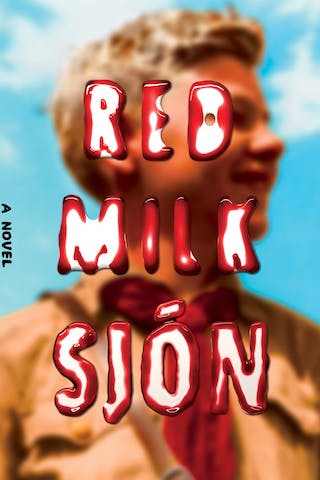
Red Milk by Sjón, translated from the Icelandic by Victoria Cribb (FSG)
What a timely book that I hadn’t heard of before today! I love Sjón’s writing (see this season of TMR), but over the past few years we haven’t been receiving galleys in any sort of regular way. Occasionally I get FSG packages from FedEx, but haven’t seen a new New Directions book since the pandemic. (Or *cough cough* since I wrote these pieces expressing my honest opinion about a couple totally unmarked manuscripts I didn’t care for, but were written by two untouchable ND authors.) This has made keeping the Translation Database up to date rather complicated, to say the least.
Anyway, fuck fascists, fuck Putin, fuck invasions, and fuck anyone who isn’t pro-Ukraine.
That said, I don’t really need your listicles, Ukrainian flags in your Twitter bios, a downtown skyline lit up in blue and yellow, or whatever other form of virtue posturing you want to display. I’m pro donation, refugees assistance, and Anonymous. Instead of telling me that your literary magazine is “supportive of Ukraine’s autonomy,” hack an oligarch.
In 2014, on the occasion of Russia invading Crimea, I wrote this post about Ukrainian literature. I thought it was a good way to utilize the Translation Database and bring some attention to Ukrainian writing. No one followed suit. Now, every day there’s a new “Read these XX Books to Better Understand Ukraine!” listicle. There’s nothing inherently wrong with this, it’s just sooooo tired. The need to “get those clicks” has such a Glengarry Glen Ross vibe to it in 2022 as legit literary magazines (The Believer, Conjunctions) are defunded in favor of facile, middle mind centric websites.

Andrea Víctrix by Llorenç Villalonga, translated from the Catalan by P. Louise Johnson (Fum d’Estampa)
Why should you support Fum d’Estampa? Because you like interesting Spanish literature. There’s my pitch. They do good books. They are the equivalent of Charco (another press whose books I haven’t laid my hands on since 2019), but for Spain. Actually, they started out doing only Catalan books (yes!), but have since expanded . . . Anyway, the main point still stands: Their books rock.
The other day, I was picking up my son from pre-K and the founder and recent winners of the local “ROC Wordle” league were on our local NPR station. Topical, I suppose; a relief from war talk?, definitely.
As a daily Wordle player—who isn’t, and who cares—I would never ever in a million years join a Wordle “league.” And will never share my daily yellow and green grid to Twitter. It all seems so embarrassing! (Look at me! Look at me!) But what I found super offensive is the fact that the top ROC Wordle League players all use spreadsheets to determine their guesses.
Spreadsheets! It’s amazing how quickly certain humans can suck the joy and fun out of things.
And yeah, I could get it in 2-3 every day if I were using this website. It’s not that that’s cheating, per se, but it’s definitely lame as fuck. Makes me want to get up at 4 am every day, solve the puzzle, and post a single word Tweet (“WATCH”) while tagging everyone I know in this “league.”
That’s crossing the line from “opinion” to “just being mean.”
But spreadsheets!!!! SMDH.
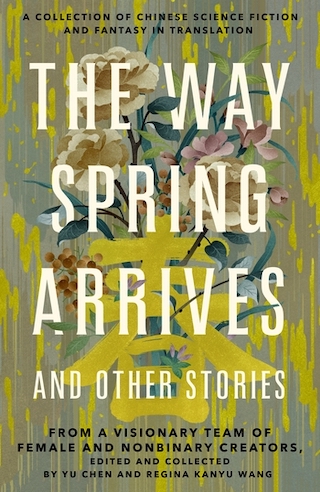
The Way Spring Arrives and Other Stories editing and collected by Yu Chen and Regina Kanyu Wang (Tor)
I have a couple of updates deserving of official press releases that I’m instead going to bury in here.
First up, the Best Translated Book Award.
When we put this on hiatus in 2020, it totally made sense. The world was ending! Everything was on fire! But now, three years later, the world is still on fire (maybe even more so), and we haven’t done a single thing.
There are two-three issues at play here. First off, the funding from Amazon dropped over the past few years, and without any other organization/angel donor to step in . . . well, reducing the prize money is a step in the wrong direction.
Secondly, the time required to coordinate fourteen judges, accept and log over six hundred submissions, and properly promote all the longlist/shortlist/winners is a lot. (Time is the villain of this post.)
Finally, I want it to be different from the National Book Award for Translated Literature and the Man Booker International. But how? What is the rationale? What makes it interesting?
If you have ideas and ambition and desire, hit me up. (Preferably by text. I’m embracing my worst email habits at this time.)
I do know what I don’t want for BTBA 3.0: Translators judging translations. This field is way, way too small for inclusions or snuffs to not feel/be personal. This is true for the translators involved and their publishers. Most translators are hustling, and if there’s an Open Letter title that’s “tied” with one from New Directions or FSG . . . we ain’t gonna win. (Actually happened, so this is still just truth saying and not hate slinging.)
And, pardon my French, translators are sooooo bitchy. I’ve ignored multiple awards this year once I saw which translators had been named to the jury. We all have agendas—mine is pro-experimental weird literature and anti-Zambra—and seeing them play out in Award Land is both disheartening and pathetic.
A correlated problem is that if you ask authors to judge these awards—the closest thing to “celebrity” in the eyes of booksellers, readers, and the like—they’ll ALSO starfuck the credibility away right from the jump. We all have motives, which is why indie booksellers kowtow to the Big Four to get bigger rewards: both in terms of financial kickbacks (aka co-op) and cultural capital.
Who should judge an award? And why do TWO PRESSES (Titled Axis and Fitzcarraldo) make up almost 50% of the International Booker longlist? The concept that out of 135 submissions, 10% make the longlist (13 titles) is already bananas enough, but to claim diversity while simultaneously worshipping the same old same old has left me cold.
I couldn’t care less about which book wins this award. There’s basically zero chance I’ll have time to read it.
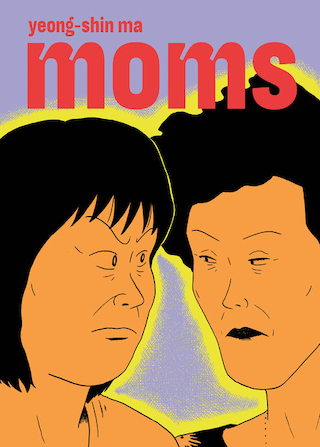
Moms by Yeong-Shin Ma, translated from the Korean by Janet Hong (Drawn & Quarterly)
Which isn’t to say the Man Booker Group Hedge Fund Premiere League Santander International Book of the Year isn’t worthy! I’ll bet it’s great. I just have zero zero time.
I mean, seriously, if there’s one book on this list I would normally make time to read, it’s a graphic novel called Moms. Based on what I know—the title, the fact Janet Hong translated it, that it’s Korean, the art—this is everything I want from a reading experience.
And yet, and yet.
Then again, with no baseball on the horizon [UPDATE: BASEBALL IS COMING BACK! And Rob Manfred? You can still go fuck a wall] I may just have spare time come April . . .
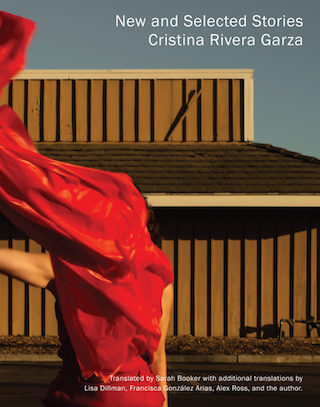
New and Selected Stories by Cristina Rivera Garza, translated from the Spanish by Sarah Booker, Lisa Dillman, Francisca González Arias, and Alex Ross (Dorothy)
Speaking of Janet Hong, Last week, Open Letter unveiled its “Translator Triptych” program featuring Katie Whittemore, Janet Hong, and Kaija Straumanis as the first three “curators.” This was something I’ve been toying with for a while because I think we need to respect translators as more than a name on the cover, and hopefully this is only the beginning of a set of changes within the industry.
We’ll get to some other radical proposals below (for you Old Timers, we’re about 300 words before I go off the rails), but I want to start by saying that translators should not negotiate for higher wages per word. Rather, they should start with a total dollar amount in mind, and work from there.
Why would a 33,000 word book be worth $0.13/word to a publisher?
Spoiler: It’s not. A book is worth its sales and grants and cultural capital. We base our offers to the author on how many copies we expect to sell—let’s do the same for translators.
If a publisher expects a ~120 page book to sell 4,000 copies, they should pay EVERYONE based on that, rather than screw the translator (“it’s short! not much work!”) and continue to advance the idea that the translator is a laborer.
From now on, I will advocate, with all of my limited financial acumen and power, for translators who bring me a fixed price they want.
You want $5,000 for a 100-page book? If it’s a book that has potential, funding, etc., then, sure! Why should I discount your earnings because the author was concise and not Jonathan Franzen? That’s not fair!
The downside is if you bring me a 1,000-page book and ask for $50K. Ain’t no way that shit computes.
There has never been so many brilliant people involved in literary translation as there are today, on March 11th, 2022. Let’s use our collective brain power to stop repeating crass capitalistic systems (did I already say “fuck Daylight Savings”? If not . . . ) and come up with fair negotiations.
Keeping in mind, this . . .
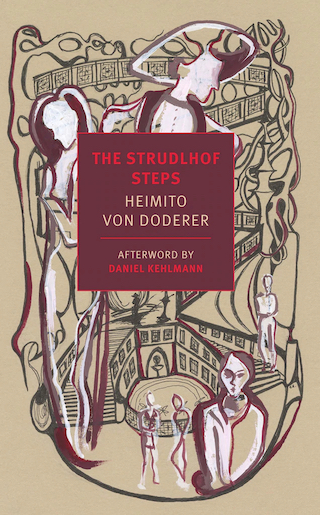
The Strudlhof Steps by Heimito Von Doderer, translated from the German by Vincent Kling (NYRB)
Printing prices have gone INSANE.
I have a 1,000 page book that, from our preferred printer, would cost $15 per unit to print. Given that we receive less than 40% of the retail price in revenue (deduct 50% discount to retailers and 26% net for distribution), we would have to sell this at $37.50 to breakeven on the printing costs alone—not taking into account fixed costs (editor, grant writer, marketing employees), marketing expenses, payments to translators and authors, etc.
The real cost—for a paperback, mind you—would have to be $50+ to make us any sort of a profit.
Y’all want to preorder that??? No? Well, I spent my entire summer vacation editing this book and hope that other people will have that same opportunity . . . someday.
But if the printing costs—due to a paper shortage, set off by Obama’s biography, with delays lasting months—fuck our cash flow and income . . . paying translators more that we currently do will become an impossibility.
There’s a reason Open Letter’s staff is two-thirds as big as it used to be and we’re both working fourteen full time jobs to keep multiple presses afloat.
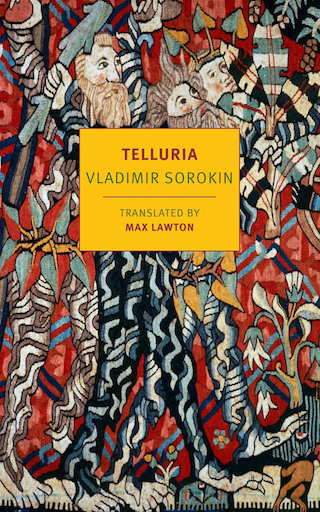
Telluria by Vladimir Sorokin, translated from the Russian by Max Lawton (NYRB)
It’s spring break at the University of Rochester, so I worked 65 hours this week trying to update the Translation Database. It’s still not complete—not quite—but it’s closer to being up to date than it has been since last summer.
Tell me what’s missing. Next month when I post another list of nine books I can’t find time to read (along with baseball anecdotes for each one since baseball is dead back!), I’ll break down some stats for y’all. And not be so navel gazing.
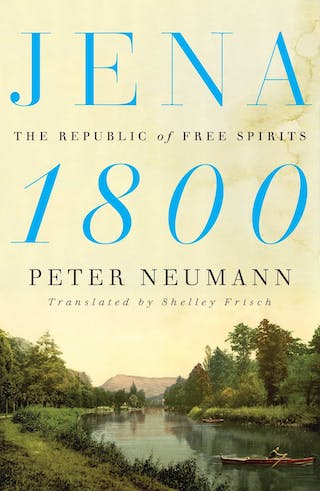
Jena 1800: The Republic of Free Spirits by Peter Neumann, translated from the German by Shelley Frisch (FSG)
Let’s end with Book #9 and the most bananas PR I’ve seen in a while.
Earlier this week, on March 8th, which happens to be International Women’s Day, Knopf, that bastion of “good taste,” announced the release of Paul Tom Cormac McCarthy’s new “book,” which is actually a diptych (aka one volume short of a triptych) coming out this fall:
“The Passenger,” which comes out on Oct. 25, takes place in 1980, in New Orleans and along the Gulf Coast. The plot is set in motion when Bobby, a salvage diver, gets assigned to explore the wreckage of a sunken jet off the coast of Mississippi, and discovers that the plane’s black box, the pilot’s flight bag and the body of one of the passengers are all missing. With the pace and twists of a thriller, the 400-page narrative follows Bobby, who is haunted by his memories of his father and sister, as he gets drawn into the mystery of the plane crash, and realizes he may have uncovered something nefarious when strange men in suits show up at his home.
“Stella Maris,” which will be released on Nov. 22 and serves as a coda to “The Passenger,” tells Alicia’s story, over roughly 200 pages. The narrative unfolds entirely in dialogue, as a transcript between Alicia and her doctor at a psychiatric institution in Wisconsin in 1972, where Alicia, a 20-year-old doctoral candidate in mathematics at the University of Chicago, receives a diagnosis of paranoid schizophrenia.
Of course, the “male” volume is twice as long as the “female” one. Although I’m willing to bet it’s only 320 pages and the final 80 are just a “rounding error.”
CODA
This video is so, so sad. And the irony should not be lost that he’s speaking for the women who made these suggestions . . .

Leave a Reply